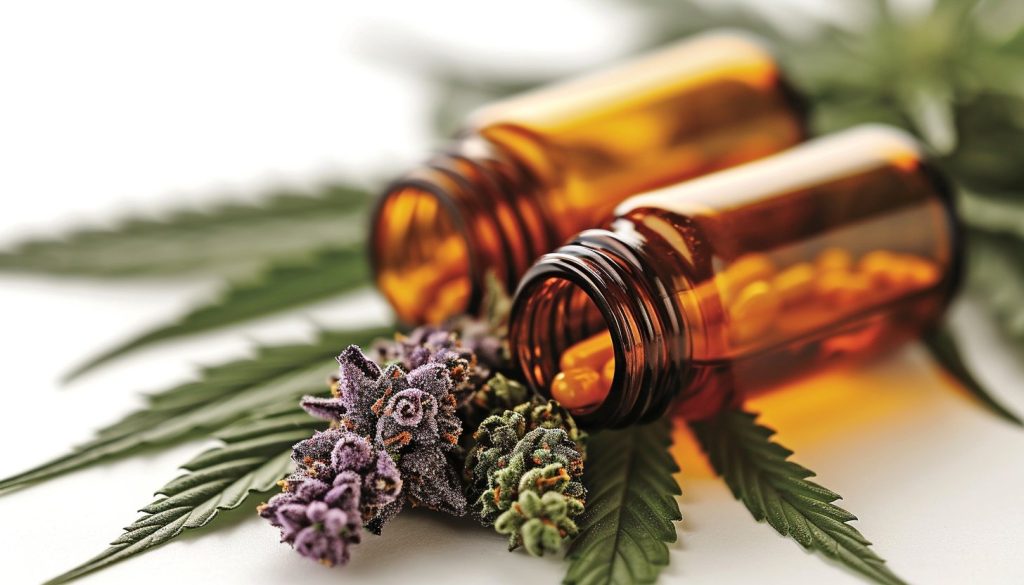In the world of pain medications, there are several options to choose from. Two substances that arouse a lot of curiosity and debate are: codeine and CBD. As CBD grows in popularity due to its potential therapeutic benefits for various conditions, some wonder if it can be taken together with a codeine product or what interactions may occur between these two substances.
Sommaire
ToggleCBD: A Brief Overview
Cannabidiol (CBD) is a non-psychoactive compound extracted from cannabis. Unlike THC, it does not produce a “high” effect and is therefore considered safe and legal in many countries, including France. CBD is used to relieve a variety of symptoms such as pain, anxiety and depression. It is also being studied for its anti-inflammatory and antioxidant properties, as well as its potential in the treatment of certain neurological diseases.
Codeine: An opioid pain reliever
Codeine is an opioid drug derived from opium, commonly prescribed to relieve mild to moderate pain and cough. It is often combined with other medications such as paracetamol or ibuprofen to enhance its analgesic effect. Opioids work by binding to opioid receptors in the central nervous system, reducing the perception of pain and improving mood.
Unfortunately, opioid medications have the potential for addiction and can cause side effects such as drowsiness, mood changes, or trouble breathing.
Interaction between CBD and codeine: What do the studies say?
The influence of CBD on opioid metabolism
CBD may influence how the body metabolizes several medications, including codeine, by interacting with the cytochrome P450 (CYP450) system in the liver. CYP450 enzymes are responsible for breaking down many chemical compounds, including drugs and medications. CBD may inhibit some of these enzymes and prevent the normal metabolism of codeine, which can increase blood levels of the latter and prolong its effects.
However, current studies are still limited and more research is needed to confirm the extent and importance of this interaction.
Synergistic effects between CBD and codeine
Another hypothesis suggests that there may be a synergy between the pain-relieving effects of CBD and codeine. CBD may increase the effectiveness of opioid medications by acting on pain receptors and enhancing their analgesic effects.
Several studies have shown that CBD may help reduce opioid consumption in patients with chronic pain, although this interaction has not been specifically studied with codeine.
It is also possible that CBD may help alleviate some of the side effects associated with taking codeine, such as drowsiness and mood changes.
Potential Risks of Combining CBD and Codeine
While there may be synergistic potential between CBD and codeine, there are also potential risks when they are combined. These risks include:
- Increased Side Effects: As mentioned earlier, CBD may inhibit certain liver enzymes that are responsible for breaking down codeine and other medications, which can increase blood levels of these substances and increase their side effects.
- Potentiated Sedative Effects: Since both CBD and codeine can cause drowsiness, combining them can potentially increase this effect. It is therefore recommended to exercise caution when using these two substances together and avoid participating in activities requiring alertness.
- Drug interactions: CBD could interact with other medications you may take at the same time as codeine, such as blood thinners. It is essential to consult a healthcare professional before combining CBD and codeine or any other medication.
Should you mix CBD and codeine?
Before making the decision to combine CBD and codeine, it is essential to carefully weigh the potential benefits and risks associated with this interaction. Every individual is different and reacts differently to substances, so it is important to consult a healthcare professional before making this decision.
When it comes to pain management, exploring all available treatment options is crucial to finding the one that best suits your personal situation. CBD and codeine are two popular options, but they may not be suitable for everyone or every situation. Finally, learning about the interactions between these two substances will help you make an informed decision about their simultaneous use.



